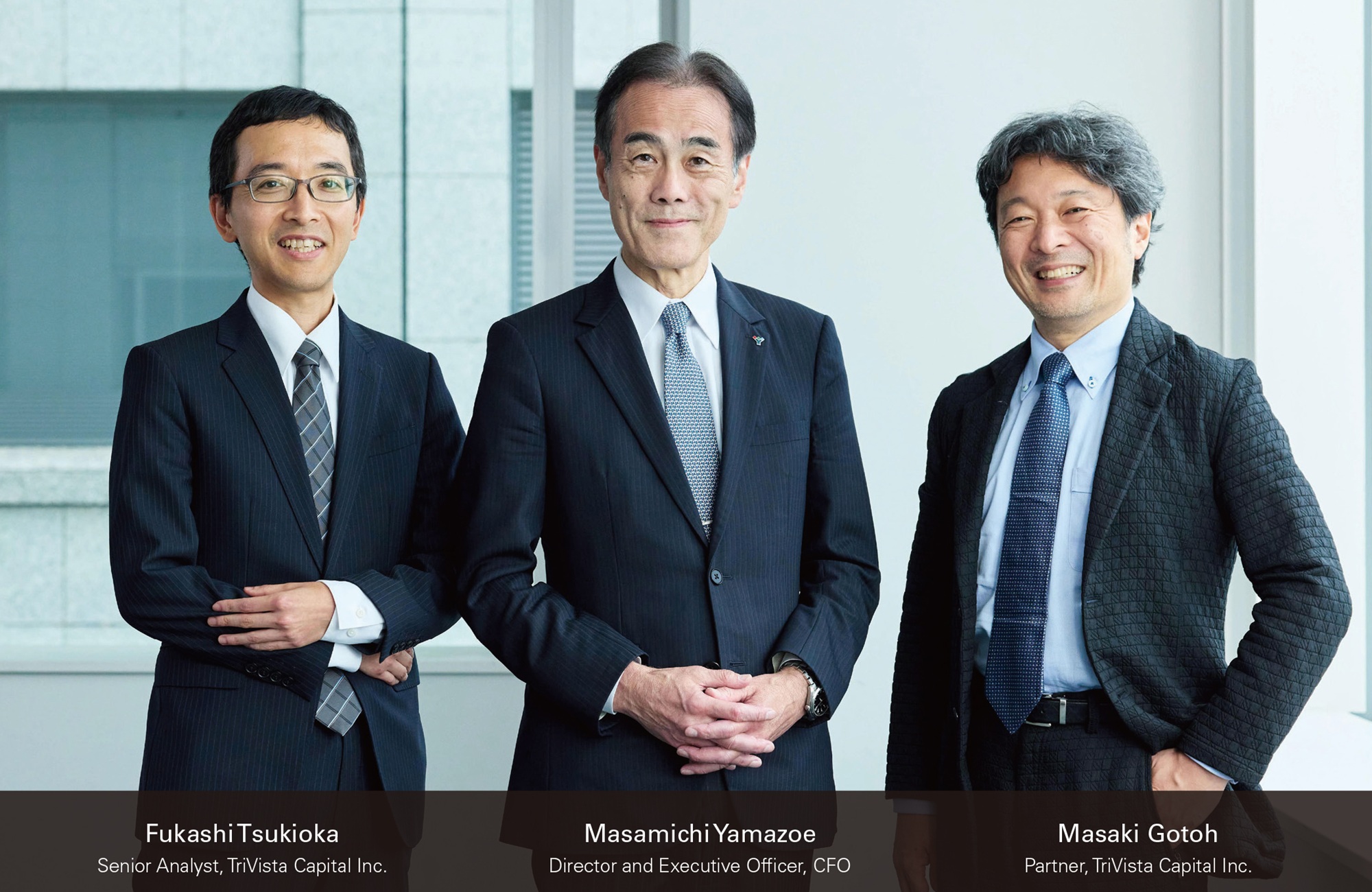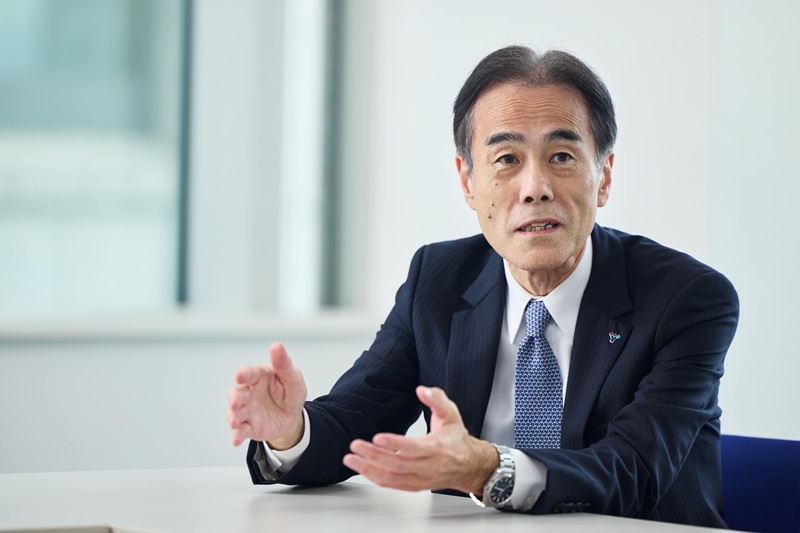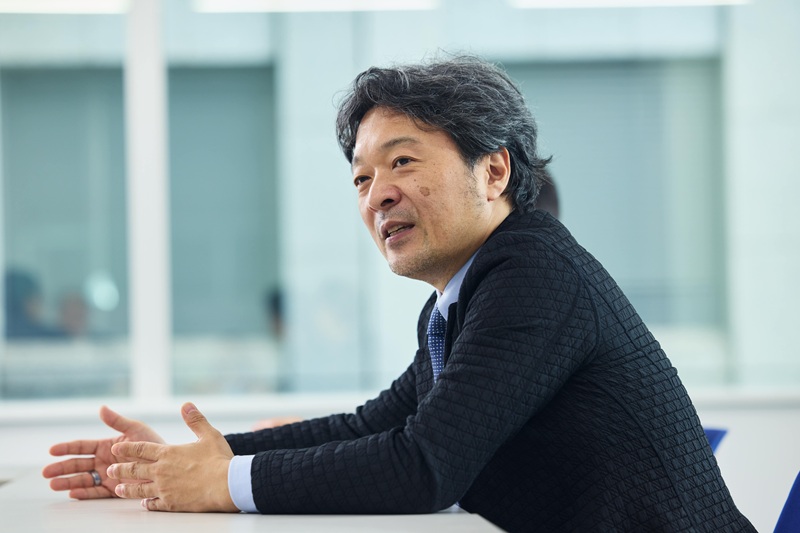-
TOP
- Investor Relations
- Initiatives for achieving Our Corporate Vision for 2030
- CFO and Investor Dialogue
CFO and Investor Dialogue
The Yamazen Group: A Company Where Investments Can Be Made with Confidence
The Need to Further Promote Business Appeal in the Capital Market

The appeal of the Yamazen Group as an investment target
- Gotoh
- Our investment strategy is quality value investing, where we seek out high-quality companies, often market leaders or near-leaders in their industries, whose stocks are undervalued by the market, and invest accordingly. The Yamazen Group is a top-tier company in machine wholesaling, yet when we started our dialogue five years ago, it was undervalued in the capital market, which led to both investment and interesting conversation. Generally, I understood that most companies in the wholesale industry conduct business by looking at client companies and their end customers, but after speaking directly with you, I realized your company is different. It was a first for me to meet a company that considers not only its clients and end customers but also its suppliers as valued customers. As our understanding of your company grew, we concluded that this culture could allow you to maintain your top industry position and continue increasing your market share. We believe that despite the short-term cycle of orders in the challenging Japanese wholesale industry, your company can steadily grow its market share. Another point that surprised us is that you have been managing your business with a focus on optimal inventory for quite some time. Nowadays, many companies manage with capital efficiency in mind. However, your company's cash conversion cycle (CCC), the most important KPI in wholesale, has been mostly negative for about the last 10 years, ensuring stable cash flow. Achieving high ROIC was one of the factors that influenced our investment decision.
- Tsukioka
- When assessing the strength of a business or a company, we often refer to ROIC. I noticed your company as a high-ROIC entity that was undervalued in the market. As Mr. Gotoh mentioned, we later learned about your business model and understood how you achieve high ROIC.
- Yamazoe
- Thank you for recognizing this. It's true that an increasing number of companies now use CCC. As a management indicator, we have long emphasized to our sales staff not to advance payments. We have continued instructing them to balance receivables and payables, avoid holding excess inventory, and keep working capital from expanding. To reinforce this mindset, we have imposed internal interest on key working capital as a management method and treated the profits after deducting this interest from departmental earnings as the actual profit. Additionally, if inventory exceeds the standard level, we impose an inventory penalty by incorporating it into performance-linked bonus evaluations. By emphasizing cash flow and inventory reduction at the operational level early on, we created a structure that instills these values in our sales staff at a deep level.
- Tsukioka
- I was astonished to hear that. It seems that capital cost-conscious management has been deeply ingrained at the ground level, even among individual sales staff.
- Gotoh
- Having implemented ROIC-driven management from an early stage is genuinely impressive. While many Japanese companies have recently started focusing on ROIC, most try to improve it by increasing the profit (numerator). And as they don't necessarily assess the invested capital (denominator) accurately, it's questionable whether they are truly managing with ROIC in mind. Unlike yours, few Japanese companies aim to enhance the efficiency of invested capital.
- Yamazoe
- That approach is likely unique to us, and it's something we achieved after many twists and turns. We, too, experienced financial difficulties, struggling with funding and limited access to bank loans, which led us to operate with as much internal funding as possible and focus on repaying loans. At the beginning of our conversation, Mr. Gotoh mentioned that we value our supplier manufacturers as customers, which stems from our founder, who, after starting the business during the post-war devastation, worked hard to sell products and quickly recover funds topay suppliers who supported us in those tough times. I believe this has been passed down as part of our DNA. From this foundation, the concept of trinity management, where manufacturers, distributors, and our Company are unified, has taken root.
Business model superiority and human capital

- Yamazoe
- We recognize that the Japanese wholesale industry faces an uphill battle. With the spread of e-commerce (EC), companies specializing in EC are emerging, and we believe some wholesale businesses will be eliminated. Currently, gathering information or securing adequate volume for specialized products like machinery and tools through EC alone is difficult. Face-toface sales remain necessary, but supplier manufacturers cannot allocate personnel for sales. As a result, products must be distributed to regional distributors to reach end-users.
- While I don't think our Wholesale Business, which coordinates this, will disappear easily, we must remain aware as a management team of the risk of being left behind. As a company, we believe that while we must continue efforts to enhance our proposal capabilities and add value to our core Wholesale Business, we also need to add new businesses. As part of this, we plan to actively expand our Engineering Business domestically and internationally and the fabless manufacturer business in home products. For example, we established the TFS (Total Factory Solution) Div. H.Q. to expand our domestic Engineering Business. This branch primarily aims to propose solutions directly to manufacturers' production sites and new industries such as food, pharmaceuticals, and cosmetics, thereby further developing the Engineering Business.
- Tsukioka
- We were also concerned that the industry was shrinking, but the performance of the TFS Div. H.Q. is steadily growing, and we feel reassured by your proactive approach to addressing industry challenges. This is one of the reasons we are encouraged to continue investing in your company.
- Gotoh
- For example, in the machinery and tools wholesale market, I believe your company has significant growth potential because it is not dominated by a few large players. Even with your company being among the top in market share, it's roughly 10% at most. Even if the overall market growth rate were zero, strategic efforts could significantly increase market share.
- Yamazoe
- As a top sales performer in the industry, I believe our employees excel at gathering a wide range of products. Many of our employees come from non-technical backgrounds. Although they may lack extensive technical knowledge, they are very skilled at assembling the best finished goods to solve customers' issues by listening to their needs and providing tailored solutions. They have strongly embraced the idea that we do more than just supply standard finished goods, rather we make various suggestions that are genuinely helpful to our customers.

- Tsukioka
- That may well be the value your company offers. I think your company is indispensable to both your customers and your supplier manufacturers.
- Gotoh
- It may be something you can do precisely because of the strong relationships you have with supplier machinery manufacturers. During the post-COVID recovery period, when global supply chains were disrupted, many companies struggled to procure essential machinery and tools. Even then, your company leveraged its robust procurement and proposal capabilities to provide customers with diverse solutions promptly. I see this as a significant strength. Your company's strengths become even more apparent when society is facing challenges.
- Yamazoe
- Recently, we have been trying to strengthen our technical proposal capabilities by arranging training where our sales staff can study with supplier manufacturers. We are also focusing on recruiting technical experts. Enhancing career training programs for different employee levels is another initiative that is strengthening our organizational capabilities.
- Gotoh
- When looking for investment targets, we seek companies that place great value on human capital. Industry leaders tend to value people highly and often have relatively high salary levels. In Japan, where the population is declining, people are now a scarce resource. A company like yours that values, nurtures, and fairly compensates its people can continue to secure these scarce resources. This is something only a leading company can achieve.
- Tsukioka
- We are long-term investors, but when we began our dialogue with your company, our primary concern was whether the Wholesale Business was sustainable. We wondered if an increase in direct transactions between manufacturers and distributors, bypassing wholesalers altogether, would be a significant risk. Through discussions with your company, we understood your business model and realized that the wholesale machinery and tools industry actually carries less of this risk. This understanding, with the logic of increased investment in people as a sensible risk-taking strategy, was one of the factors that led us to invest in your company.
Capital cost and share price-aware management
- Yamazoe
- As I mentioned earlier, we once aimed for a debt-free management approach, which led to an accumulation of funds. As times have changed, we now live in an era that demands capital efficiency, and we paid careful attention to this when developing our mediumterm management plan. However, we don't consider all the funds we hold to be surpluses. Looking ahead to the industry's future, some markets may shrink, while others may grow and require further management resources. If the wholesale industry faces challenges, we must proactively consider M&A or industry restructuring to expand into other areas. This takes funding, and since creditworthiness is crucial for a wholesaler, maintaining a favorable credit rating to control funding costs is also essential. When thinking about capital efficiency, we try to always consider that balance.
- Gotoh
- As I mentioned, we emphasize ROIC in our investment decisions. And of course, the level of ROIC varies by business. I recognize that it is challenging for a high-ROIC company like yours to aim even higher. However, I hope your company can continue growth investments by identifying promising business opportunities and using retained earnings or borrowed funds to both grow the company and maintain or improve ROIC. That being said, ROE is a different matter. ROIC is about the return on capital invested in the business and reflects business management philosophy. At the same time, ROE is a KPI that indicates whether returns exceed the cost of shareholders' equity. If non-business-related assets are included in shareholders' equity, ROE will inevitably not increase, and the price-to-book ratio (PBR) will not improve. Management focused on an optimal balance sheet leads to improved ROE.
- Tsukioka
- Your company has set a target shareholders' equity ratio of 40 to 45%, establishing not only a lower limit but also an upper limit. We expect the awareness of not holding excessive shareholders' equity to contribute to improving ROE. Our company would like to see funds directed toward growth investments if opportunities are expected to yield returns above the WACC. If such attractive investment opportunities are unavailable, we hope you will maintain an optimal balance sheet through dividends or share buybacks.
Sustainable growth of the Yamazen Group

- Gotoh
- Defining a quality company in a single phrase is challenging, but I believe companies that can maintain a sustainable competitive edge will continue to win over the long term. It took time to understand your company's competitive edge, including its corporate culture. However, once we understood it better, we concluded it has the qualities we seek. Despite future market fluctuations, we believe it is a company in which we can continue investing confidently. We are neither activists nor an engagement strategy fund. Engaging in dialogue with the management of our investment targets is natural for long-term investors. As shareholders-partners, essentially-over long periods, we aim to increase corporate value through dialogue. We are shareholders, partners, and fans of your company. That is why we hope to continue this dialogue with you, and look forward to your future business development.
- Tsukioka
- I feel that your company's strengths have not yet been fully conveyed to the capital market. Reading this integrated report, I hope that even a little of its appeal will come across. In the future, I hope you will take the time to engage meaningfully with the capital market and continuously communicate your company's value. We look forward to it.
- Yamazoe
- We intend to continue cherishing the DNA inherited by our sales staff. If we mark out the regions where we operate on a world map, there are still many blank spaces that we will continue to color in. Even in the challenging wholesale industry, we see potential in individual businesses. By changing perspective, growth opportunities can be found close by. Moving forward, our Group's growth will remain at the core of our thinking. Over the past year or two of conducting IR activities, I have come to appreciate the importance of incorporating external perspectives. While we sometimes receive harsh advice, including from investors, rather than accepting everything at face value, I see it as an opportunity to consider the Group's position and determine the most suitable course of action. I really appreciate everything we've discussed today. Thank you for your valuable time.
